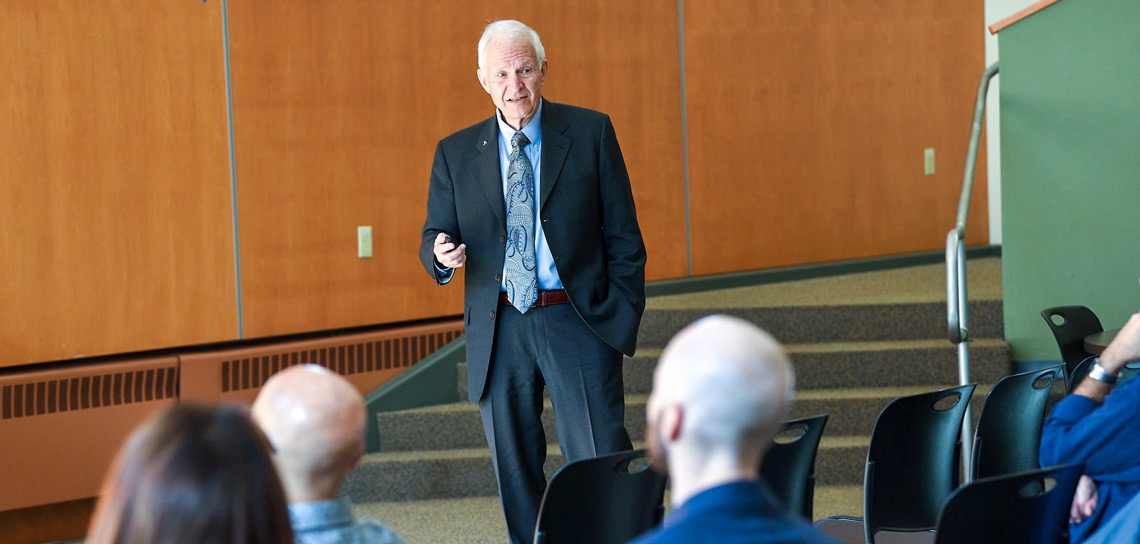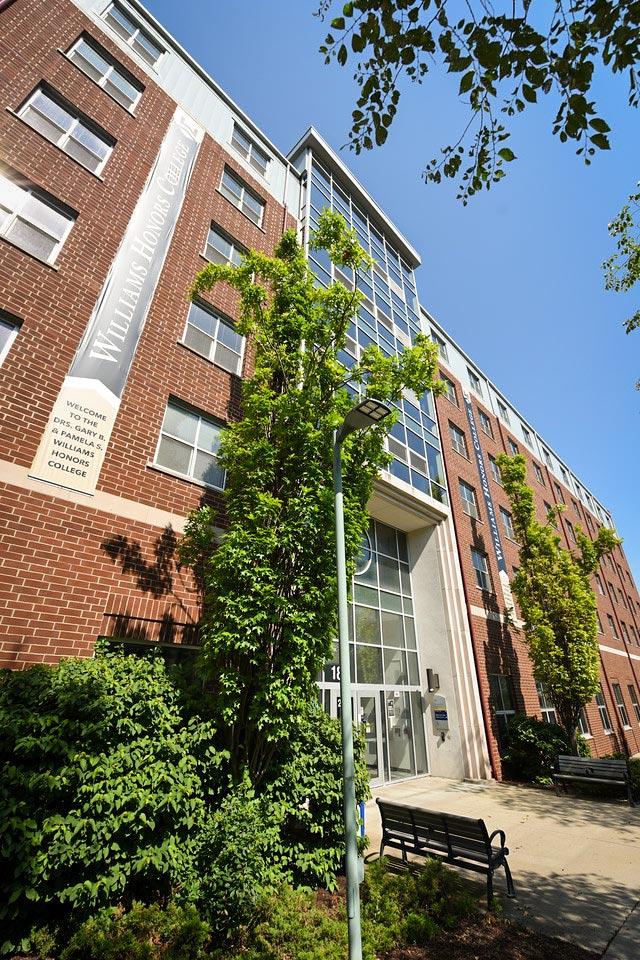Building a community: Dr. Dale Mugler reflects on founding and future of Honors College

Dr. Dale Mugler, inaugural dean of the Honors College, delivered a presentation in the Honors Complex in late 2019 on how the college has shaped the lives of its alumni.
While celebrating its sesquicentennial, The University of Akron (UA) has also been celebrating the 45th anniversary of its Honors Program and the 15th anniversary of its Honors College, now the Drs. Gary B. and Pamela S. Williams Honors College.
In 2000, Dr. Dale Mugler, professor of applied mathematics and biomedical engineering, was selected to lead the Honors Program, which since its founding in 1975 had existed without a college or building of its own. Dr. Karyn Katz, professor of speech-language pathology and audiology, was named associate director.
Soon after their appointment, Mugler and Katz proposed the formation of a full-blown college, with an academic and residence hall—giving the program a place, the curriculum a community and honors students a home.
That vision was realized in 2005, when the Board of Trustees approved the transformation of the Honors Program into the Honors College, naming Mugler its inaugural dean and Katz its associate dean. The Honors Complex, a six-story residence hall with an academic wing, at the center of campus, was completed the same year.
Under Mugler’s direction, the Honors College provided a rigorous interdisciplinary curriculum, promoted undergraduate research and hosted world-renowned guest speakers. Over its first decade, the college saw continuous growth in enrollment, attracting and producing award-winning student scholars, many of whom became distinguished postgraduates and professionals.
A brief history of UA’s honors program, college
Mugler retired as dean of the Honors College in 2015 but continues his relationship with UA as chief technology officer of a startup company established by the University of Akron Research Foundation, Ocius Technologies LLC. The startup has received more than $1.5 million from the Defense Advanced Research Projects Agency (DARPA) for its work on using analog chips to make computers faster, with potential application in nuclear fusion, aircraft and weather simulations.
Mugler, at a recent visit to the University, reflected upon the origin of the Honors College (renamed the Williams Honors College in 2016), its success over the years and his hopes for its future.
Q: When did you first get involved with the Honors Program?
A: I came to the University in 1989 as a professor of mathematics and eventually biomedical engineering. I became a member of the Honors Council in 1995 and taught the honors section of Calculus I. I really enjoyed it, and I think that those were some of the best classes of undergraduates that I taught.
Q: After being named director of the Honors Program in 2000, what role did you play in the formation of the Honors College five years later?
A: It was a group effort. Karyn Katz, the associate dean at the time, and I initiated the proposal. The late Helen Qammar, a chemical engineering professor, was instrumental in helping us persuade the Honors Council and Faculty Senate that the new college would be supported and would give students expanded opportunities. It took us a year, but when we got our proposal to the committees, the vote was unanimous.
Q: Why was it important to have an Honors College?
A: I knew we had good students. I could see them in my classes as early as 1989. And one way to serve those students, and to build the prestige of the University at the same time, is to have an Honors College. A lot of other MAC [Mid-American Conference] schools already had an honors college. Then we got this facility and the big residence hall and, all of a sudden, we had better facilities than our competitors.
Q: Tell me about those facilities — about the Honors Complex.
A: The idea of community was fundamental to everything we did. We were trying to get students together to talk to each other, encourage each other, support each other, challenge each other. So having a residence hall was a key thing, to get everybody together.
Before building the new residence hall, we surveyed students to ask them what they would like, and one of the key things was study halls on each floor. The University included Karyn and me on all of the architectural planning sessions — which I thought was really nice — and there was a suggestion, at one point, that we just build a residence hall, no classrooms or study halls. We put up a big fuss. I’m not sure who made the final decision — somebody said it was worth the effort — but we got our classrooms, a computer lab and a two-story Common Room, now named in honor of Betty Jacobson. Having the academic wing made a big difference.
Q: Describe your early recruiting efforts. What kind of student were you looking for?
A: Karyn and I decided to add a personal touch by having prospective students interview with faculty members in their field for admission and scholarship considerations. The faculty liked being able to talk to really good students who might be in their program. We were looking for students with curiosity, intellectual curiosity. And we wanted students who would fit into that community idea.
Q: What were some ways you built that community?
A: We got the students together right away, in the summer, even before they came to school. For example, Emerging Leaders participate in a leadership training program before their fall semester. We have Tom Faessel, from Residence Life and Housing, to thank for that. He’s one of the unsung heroes at UA.
We also started a number of student groups that drew people together, even if they weren’t living in the hall, such as a group for commuting students. We had Honors Club and eventually a nursing honors group, EUREKA for honors engineers and a group for business majors, among others. Having been a music major in college, before I switched to math, I founded two a cappella groups, Rhythm & ‘Roos and Kanga Blue, which have since been extended to the entire UA student community.
We also developed an alumni group with a board that met every other month or so.
Q: What have been some of the strengths and highlights of the Honors College?
A: Many students have said that the Honors Colloquia [Latin for “conversations”] were the best courses they had as undergraduates. Those courses brought students together to talk openly, to learn from others in different fields of study, and to interact with excellent teachers.
Also, we have always pushed undergraduate research, because everybody’s supposed to do a research project. I tried to get our best students to connect with faculty members, and get involved with research, as undergraduates.
And we’ve had a number of students receive nationally competitive honors and awards, such as Fulbright Awards, as well as graduate appointments in prestigious universities. One year we had two students win, and one student named an honorable mention for, the Goldwater Scholarship, a competitive science award you have to apply for in your junior year. We had another student who was a finalist for the Rhodes Scholarship. He got an equivalent award, called the Gates-Cambridge Scholarship, and eventually went to Cambridge and got his Ph.D. there.
We hosted all sorts of guest speakers, too, including Steve Wozniak, one of the co-founders of Apple. We hosted Yvette Nicole Brown, Elie Wiesel and Neil deGrasse Tyson. Tyson was a wrestler when he was in college, so we encouraged one of our students to wrestle him — and they did, right here on the floor.
Q: What are your hopes for the Williams Honors College, moving forward?
A: One hope is that we develop a national reputation for our students who study abroad. While I was living in Santa Clara, Calif., before coming to UA, I received a fellowship to study in Aachen, Germany. It was one of those cultural experiences that made me realize how important it is for students to study abroad.
I hope that we continue to bring prestige to the undergraduate program, to make it a destination for good students, where they know they’ll be supported. And I’m hoping that the Williams Honors College buoys up the rest of the University at the same time.
Q: What advice do you have for current and future honors students?
A: Take advantage of opportunities, and know that you might not end up working in the field that you initially majored in. We had an economics major who became a veterinarian, and a jazz guitar major who is now studying physics at the University of California, Berkeley.
Q: Are you doing any teaching these days? Do you have any interaction with former students?
A: I’ve volunteered in the local high school and would like to tutor calculus students near our home in Illinois. This summer, our young company had a high-achieving student intern from Jackson High School. I worked to help her understand the physics behind our company’s analog computer simulations. In the winter we move to Charleston, S.C., where I’m an adjunct professor in the Center for Biomedical Imaging at the Medical University of South Carolina, doing research on new methods in Magnetic Resonance Spectroscopy.
I keep in touch with a number of my former Honors students. So many of them are involved in health care, and are in the front lines of people serving others during the pandemic. Several of them write me, and I really like keeping in touch.
RELATED

The Honors Complex, home of the Williams Honors College.
